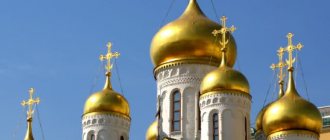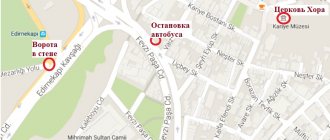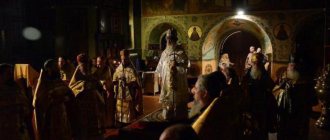In turn, the press secretary of the Patriarch of Moscow and All Rus' Kirill, priest Alexander Volkov, noted that believers of the Russian Orthodox Church will not be able to pray and receive communion in churches on Mount Athos due to the rupture of relations between the Moscow and Constantinople patriarchates. “Athos is the canonical territory of the Patriarchate of Constantinople with all the ensuing consequences,” Volkov told TASS.
He explained that the severance of relations “for the believers of our Church means that from now on until the position of Constantinople changes and, accordingly, the Russian Church revises its position, they will not be able to participate in divine services, receive communion, pray in the churches of the Patriarchate of Constantinople, or take part in other sacraments” .
Earlier, Volkov noted that with its actions in Ukraine, Constantinople crossed the red line and violated the unity of world Orthodoxy.
“We did everything to avoid a split”
The decision of the synod is the only possible one in the current situation, since the Russian Orthodox Church did everything to avoid complicating the situation, Vladimir Legoida, head of the Synodal Department for Church Relations with Society and the Media, told TASS.
“It seems to me that the Russian Orthodox Church did everything to prevent this from happening. I believe that we have absolutely nothing to blame ourselves for and that we did not give any reason for such actions, which led, as the members of the Synod stated today, to the exit of the Patriarchate of Constantinople from the canonical field. “I think that the members of the Synod of the Russian Orthodox Church had no other way to respond, since this really takes Constantinople beyond the existing canons and does not allow us to be in Eucharistic communion with them,” he noted.
Legoyda was not ready to estimate the duration of the rupture of relations, but expressed hope that the Patriarchate of Constantinople would reconsider its decisions.
“There is hope that these decisions will be revised in Constantinople <...> we need to behave calmly, with an understanding of the complexity of the situation, but still with the hope that the situation will return to some kind of normal coexistence between us,” he said official representative of the Russian Orthodox Church.
Church schism in Ukraine
Since coming to power in February 2014, the previous leadership of Ukraine has actively promoted the idea of creating a local Orthodox Church in the country that would not be associated with the canonical Moscow Patriarchate. In April last year, ex-President Petro Poroshenko personally appealed to the Patriarch of Constantinople with a request to grant autocephaly to the Ukrainian church; his appeal was supported by parliament.
On December 15, in Kiev, representatives of the Patriarchate of Constantinople, with the active participation of the Ukrainian authorities, held a so-called unification council, at which two schismatic organizations - the Kiev Patriarchate and the Ukrainian Autocephalous Orthodox Church - announced the creation of the so-called Orthodox Church of Ukraine (OCU). On January 6, the Patriarch of Constantinople handed over the tomos of autocephaly to the head of the OCU, Metropolitan Epiphanius. The Russian Orthodox Church considers both the tomos of autocephaly and the “unification council” in Kyiv to be canonically insignificant.
there is hope
Experts interviewed by TASS also agree with Legoyda’s opinion regarding the possibility of a peaceful resolution to the current situation. “It is important to say that the position of the church is balanced, despite the demand of both many politicians and Orthodox conservatives to almost anathematize Bartholomew, immediately depose him, establish parishes in Turkey, and begin to act unreasonably and radically. The Synod did not agree to this. It seems to me that this just gives us hope for a more peaceful resolution of the crisis,” said leading researcher and head of the Center for the Study of Problems of Religion and Society at the Institute of Europe of the Russian Academy of Sciences, religious scholar Roman Lunkin.
A specialist in the history of the church in Ukraine, professor at St. Tikhon’s Orthodox University, Vladislav Petrushko, believes that what is happening between two local Orthodox churches cannot be called a new Great Schism, similar to what happened in the 11th century, when the Church was finally divided into the Roman Catholic Church in the West with the center in Rome and Orthodox - in the East with its center in Constantinople. “Maybe something will change in Constantinople, maybe something will happen, so it is in no way possible to say that, as happened in the 11th century, and that’s it, we are divided,” the expert noted.
“There has been a split of a small part from world Orthodoxy in the person of the Patriarchate of Constantinople, which can be called a schism with exaggeration,” religious scholar Roman Silantiev agrees with Petrushko, who called the decisions of the Synod expected and logical.
On the other hand, Petrushko recalled, when the Great Schism took place, similar events led up to it, when communication between Rome and Constantinople was temporarily broken, then restored, then broken again.
“It started small, but came to a final break. Therefore, of course, on the one hand, it’s too early to call it a day; on the other, we must be wary of how these events might develop into something more. So far the situation is developing according to the most unpleasant scenario, the most negative,” he added.
New split of the OCU
On June 20, 2021, under the leadership of the head of the schismatic Ukrainian Orthodox Church of the Kiev Patriarchate (UOC-KP), Filaret, a local council of the UOC-KP was held, at which the resolution on the liquidation of the UOC-KP, adopted at the request of Patriarch Bartholomew of Constantinople on December 15, 2021, was canceled. The Council decided that the UOC-KP was registered by a government agency and continues its activities, continues to be the owner of all money and all property, and Patriarch Filaret remains its head. The OCU called the local council of the UOC-KP non-statutory, having no “canonical and legal consequences.”
What's next?
The decisions of the Synod of the Russian Orthodox Church confirm the balanced position of the Russian Church on the territory of Ukraine, where the Russian Church primarily protects the interests of the UOC, Lunkin believes.
“Actually, Metropolitan Onuphry, head of the UOC, was also present at the Synod. Therefore, I think that, naturally, every phrase was agreed upon with Metropolitan Onuphry, so that it would not harm the Ukrainian Orthodox Church in any way. This was the reason for such a balanced decision, such strict reasoning, without any unnecessary emotions that could be found in the September statements,” the expert said.
In his opinion, in fact, two large Orthodox forces are now appearing on the territory of Ukraine: the first is the UOC as part of the Russian Orthodox Church, the second is “a certain conglomerate of schismatics recognized by Constantinople, who are now subordinate to Patriarch Bartholomew, because he called them the Kyiv Metropolis, his territory.” .
“It is interesting to note here that the statement of the Synod specifically notes that Bartholomew tried to steal from the Russian Orthodox Church something that never belonged to him. That is, the Kiev Metropolis in the current territory is still the fruit of missionary work, and the expansion of the Kyiv Metropolis took place already as part of the independent Russian Orthodox Church, and not what happened in the 17th century,” Lunkin said.
Russian Orthodox Church
Metropolitan Hilarion of Volokolamsk, Chairman of the Department for External Church Relations of the Moscow Patriarchate, gave an interview to the TASS news agency.
— The most contradictory information is being received about the Council of Bishops of the Greek Church, which took place on Saturday, mainly from anonymous sources. Perhaps you could explain what decisions were made at it, and how the Russian Church evaluates them?
— We are still learning about what the Greek Church decided at its Council from the press. The communiqué of the Council was published, the speech of Archbishop Jerome was published. All this, of course, requires careful analysis before we can draw any conclusions. A reaction to this event will follow, and this reaction will be formulated by the Holy Synod of our Church, which will meet in the near future and consider this and other issues.
— Over the 10 years that you have headed the Department for External Church Relations, much has changed in the relations of the Russian Church with non-Orthodox Christians, with other Orthodox Churches, with foreign states. What tasks faced “church diplomacy” 10 years ago, and how do you see them now? How does building a dialogue between the Church and the world differ from secular diplomacy?
— The tasks facing the DECR are always the same. But as the world around us changes, the situation changes, and some events occur to which one cannot help but react, the emphasis in the Department’s activities shifts accordingly. For example, a significant part of our time and attention was devoted to the preparation of the Pan-Orthodox Council. We expected that this would be a truly Pan-Orthodox Council, that issues important to the Orthodox Church would be resolved there, but since a number of churches refused to participate in the council, we had to refuse. After this, events in the Orthodox world began to develop rapidly, and, unfortunately, in a negative direction. At the end of last year and the beginning of this year, events occurred that actually meant a split in the family of Orthodox Churches.
What happened in Athens on Saturday is a deepening of this rift. It is difficult to say now how far this can go. When in 1054 the papal legates arrived in Constantinople to sort things out with the Patriarch of Constantinople, and the showdown led to a rupture in Eucharistic communion between the Roman Church and the Church of Constantinople, no one could foresee that this division would last a thousand years and what grave consequences it would lead to .
I think it's very important now to try to look forward. Among those who play chess, there are people who are able to calculate the situation only one move ahead, and there are those who are able to calculate it many moves ahead. We now need to determine what our next steps will be and what risks they involve. In any case, we should not act emotionally, under the influence of feelings of indignation and bewilderment - we must carefully and calmly weigh everything and prayerfully make the decision for which we will then bear responsibility.
— The severance of prayerful communication with the Patriarchate of Constantinople was a difficult decision for the Church. How did it affect the situation of Orthodox Christians in Ukraine? Is there still hope for the reunification of the divided Church, and what is the main obstacle for it?
— I must say that the break with Constantinople had no effect on the internal life of the Russian Orthodox Church, including its self-governing part, the Ukrainian Orthodox Church. As we lived, so we continue to live, as we served, so we continue to serve, as we celebrated Easter and other great holidays, so we continue to celebrate. We did not feel any damage resulting from this rupture.
The Patriarchate of Constantinople made a big mistake, and it continues to insist on this mistake, demanding recognition of the so-called Orthodox Church of Ukraine from other Local Churches. But we see that the OCU did not succeed as a Church. It was initially composed of two schismatic groups; within a few months of its existence, it managed to split into two parts, and the church people did not follow this group. Patriarch Bartholomew assumed that the episcopate of the canonical Ukrainian Orthodox Church would join this group as soon as it received the tomos of autocephaly. The tomos was received, but the episcopate remains united around His Beatitude Metropolitan Onuphry, the bishops of the Ukrainian Church declared their desire to maintain unity with the Russian Orthodox Church, and that they are completely satisfied with the current status of the Church. It is quite obvious that the split has not been overcome, but on the contrary, the split is deepening.
— Unity with Constantinople has become impossible for the Russian Church not only because of the dispute over whose jurisdiction Ukraine belongs to, but also because of views on the powers of the Patriarch of Constantinople. In this case, will the revocation of the tomos of autocephaly issued by the OCU be sufficient for its restoration, and if not, then what should happen? Can unity now be restored at all?
“One can hardly count on Constantinople to revoke the tomos that it issued. Of course, the Patriarch of Constantinople revoked the decision of one of his predecessors three hundred years ago, but we do not take this kind of action seriously and consider them insignificant from a canonical point of view. I think it is premature to talk about any improvement in the situation and healing of the wound. Apparently, some time will pass before the Orthodox Churches jointly find a solution to the current situation.
— Apparently, this will require a Pan-Orthodox conference, which has already been held, or a Council? In what format can it be found?
— It’s difficult for me to talk about the format now, because I don’t see any readiness on the part of Constantinople to conduct a dialogue at all. We see only actions aimed at ensuring that this hastily accomplished act is recognized by other Orthodox Churches, and this is a dead-end path, because anyway a significant part of the Churches does not recognize it, and accordingly, these recognitions can only deepen the schism that has already formed.
— Archbishop John (Renneto) and the clergy and laity who followed him from the Archdiocese of parishes of the Russian tradition in Western Europe were recently received into prayerful communion. In what form will the former Archdiocese of the Patriarchate of Constantinople exist within the Russian Church and how will it be connected with the Patriarchal Exarchate of Western Europe? Which of the features of its worship and parish life, developed over the decades of the Archdiocese's existence, can be preserved?
— Those parishes that serve according to the new style will continue to serve according to the new style. Those parishes that serve in French, German or another language will continue to serve in the language to which they are accustomed. The archdiocese will exist as a single and integral structure, headed by its archbishop, within the bosom of the Russian Orthodox Church. It will not be part of the Western European Exarchate, nor part of the Russian Church Abroad - it will have its own structure, the same one that it has developed, and will preserve its traditions.
— Patriarch Kirill of Moscow and All Rus' called this reunion the closure of the topic of separation of the Russian Church and the Russian diaspora abroad. Does this mean that the catechetical tasks and directions of the missionary work of the Russian Church abroad will change? Could, for example, a service appear in languages other than Church Slavonic?
“We already have missionary work in different countries, and worship services are conducted in different languages. For example, I headed the Hungarian diocese of our Church for six years, and there, in most parishes, services are performed in Hungarian. And in the Japanese Autonomous Orthodox Church, divine services are performed in Japanese, in Moldova - in the Moldavian language. In parishes far abroad, the practice is different: where the majority of parishioners are Russian, the Church Slavonic language is used, and the sermon is delivered in Russian. Where the majority of parishioners belong to the local population, there, accordingly, both divine services and sermons are performed in the local language. So we already have this practice.
Our missionary strategy in foreign countries is built on two main principles. One principle is that we are engaged in the care of our flock, that is, those people who already belong to our Church. And another principle is that we are open to representatives of other traditions who want to join our Church - regardless of their nationality, their language, we accept them with love. At the same time, we do not engage in proselytism - we do not go to churches of other faiths and do not say that our faith is true and yours is not. But when people come to us, we, of course, open our doors for them and do not hide the fact that we consider our faith to be true, and not some other.
— How are the Patriarchal Exarchates of Western Europe and Southeast Asia, created at the end of last year, developing?
— If we talk about the Patriarchal Exarchate of Southeast Asia, it was created in response to the needs and aspirations of our people, and it is developing very dynamically. I recently visited the Philippines and participated in a service at which there were many Filipino parishioners and Filipino clergy. And, of course, in the dioceses of our Church they ordain not only Russian people, and not only Russian-speaking people - we have many clergy who speak only their native language and serve in their native language.
The Patriarchal Exarchate of Western Europe is also developing dynamically, new parishes are opening - literally at every or almost every meeting of the Synod we decide to open new parishes. And all this is due to the fact that interest in the Church is not decreasing, but increasing - we see this both in our Fatherland and beyond its borders.
— In the Philippines, the situation is especially interesting - President Rodrigo Duterte, who invited Orthodox missionaries to the country at the Valdai Forum in Sochi, in some statements positioned himself as an atheist, there were even certain conflicts between the authorities and the Catholic Church. Did this apply to local Orthodox Christians?
— Missionary activity is developing actively—there are already more than 30 parishes of the Russian Orthodox Church in the Philippines. The difficulties that the Catholic Church has had or still has with local authorities do not in any way affect our missionary activities. Moreover, the Catholic Church treats our presence in the Philippines very favorably - I had the opportunity to verify this when I met with the Archbishop of Manila, Cardinal Tagle, who heads the Catholic Church of the Philippines.
— Are there any representatives of the first wave of emigration left in the Philippines: those who got there from China in the 1940s?
— Those parishes that now exist in the Philippines - their parishioners are either emigrants of the last wave, or local residents who are interested in Orthodoxy and accept Orthodoxy. Now there is nothing left of the pre-war emigration in the Philippines, because the Philippines turned out to be a transit point for it. Indeed, at some time there was a large group of Russians, St. John of Shanghai was there for some time, but then they all moved on, and the main part of them ended up in Australia, and some of them in America.
— Are there any conflicts with the Patriarchate of Constantinople, which considers the countries included in the Patriarchal Exarchates to be its canonical territory?
— Since the 1920s, the Patriarchate of Constantinople has been developing a theory according to which in the so-called diaspora there should only be the presence of the Patriarchate of Constantinople, and not the parallel presence of different Orthodox Churches. But the Local Orthodox Churches, which have dioceses and parishes in the diaspora, do not agree with this theory - this is the Antiochian Church, and the Russian, and the Georgian, and the Serbian, and the Romanian, and the Bulgarian - all of them have parishes in the so-called diaspora.
In general, the very concept of “diaspora” is very controversial, and in the Orthodox world it does not have a single interpretation. Historically, parishes and dioceses of the Russian Orthodox Church appeared where Russian people or members of our Orthodox Church belonging to other nationalities appeared. In total, our Church has more than 800 parishes in the so-called diaspora, and their number is constantly growing. We have no reason to believe that all these parishes and this entire flock should go to the Patriarch of Constantinople, especially since we see how much attention he pays to our flock.
For example, in Turkey, where until recently the Russian Church was not present at all, since we perceive Turkey as the canonical territory of the Patriarchate of Constantinople, no serious pastoral work was carried out with our believers. There were sporadic services, people felt abandoned, abandoned. They contacted us, but we could not respond to these requests, because we believed that the Patriarchate of Constantinople should be involved in the pastoral care of these people. We have repeatedly proposed to the Patriarchate of Constantinople to send Russian priests there, and we would place these priests under its jurisdiction, but he categorically refused this. And now the situation has developed in such a way that our believers can no longer receive communion in the parishes of the Patriarchate of Constantinople, so priests of the Russian Orthodox Church perform services in Turkey and provide pastoral care for parishioners.
— Several years have passed since the meeting of the Patriarch of Moscow and the Pope in Havana. How is the dialogue with the Roman Catholic Church going now, and is there a need for repeated meetings of the Primates - for example, in Russia, which Pope Francis has repeatedly spoken about his desire to visit, or in the Vatican?
— The meeting between Pope Francis and Patriarch Kirill was of a historical nature, and this meeting opened up a very wide space for interaction in all areas. We are now working to implement what the Pope and Patriarch agreed upon. So far I have not heard of any new meetings that are planned.
We are working to help Christians in the Middle East. This assistance is provided in different ways, primarily through support at the political level, but also through humanitarian actions aimed at improving the situation of those Christians who remain in Syria and other countries in the Middle East who need help. The Catholic Church has been conducting its charitable work in the Middle East for a long time, but recently we have begun to coordinate our efforts, and we are already seeing some of the fruits of this coordination. I think that we will increase our interaction in this area, as well as in other areas in which this interaction will be in demand.
We have a working group on cooperation between the Russian Orthodox Church and the Roman Catholic Church, this group is headed by me and Cardinal Koch, and we discuss various projects that are carried out in the cultural sphere, as well as in the field of charity and social service.
As for the assistance that comes from the Russian Orthodox Church together with representatives of other religious denominations of Russia, there have already been several deliveries of entire batches of humanitarian aid, once there was 77 tons of it, and this assistance is distributed among the population of Syria, regardless of their religious denomination accessories.
— Theology was recently introduced into the system of scientific specialties in Russia. Has the Russian academic community of theologians and theologians already formed? How in demand is the specialty among students of secular educational institutions who do not plan to become clergy in the future?
— Such a community is in the process of formation. From the moment theology was legalized as an academic specialty until we have a community of theologians in the secular educational space, some time must pass. Suffice it to say that when we created the first state-recognized dissertation council in theology, it included more than 20 doctors of science, but not one of them was a doctor of theology - for the simple reason that theology as a recognized science in the Russian educational space is not existed. But now dissertations are defended in this theological council; there have been several such defenses, and it can be assumed that in a few years we will have a sufficient number of certified theologians, from whom, in turn, it will be possible to form new dissertation councils.
The development of theological science in the secular educational space is the call of the times. I observe great interest among the rectors of our leading educational institutions in this area of scientific research, and I really hope that theology will develop not only in confessional theological schools, but also in the secular educational space.
Interviewed by Pavel Skrylnikov
DECR Communications Service/ Patriarchia.ru









